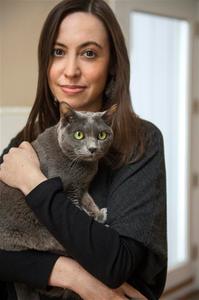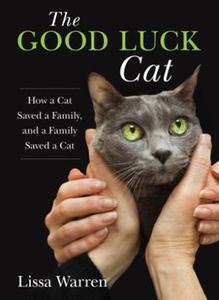
|
|
| photo: Liz Linder | |
Lissa Warren is v-p, senior director of publicity at Da Capo Press and the author of The Good Luck Cat: How a Cat Saved a Family, and a Family Saved a Cat (Lyons Press, October 7, 2014), a memoir about grief, hope and how pets both complicate and enrich our lives.
On your nightstand now:
A pair of eyeglasses I don't let anyone see me in; a bottle of Sheer Cotton nail polish that I've been meaning to use for about a week now; The Dog Year by Ann Garvin, who was nice enough to write a blurb for my book--it's a novel about a stray dog who saves a straying woman; and a soon-to-be-opened jar of Gerber turkey and gravy baby food, which I'm about to feed to my cat. If you read my book, that sentence may seem less crazy.
Favorite book when you were a child:
My dad was college friends with publishing VIP Esther Margolis, and she gave him a galley of Lynne Reid Banks's The Indian in the Cupboard to give to me. The idea of getting to read a book before everyone else got to read it was delicious. Still is. Before that, picture books like Bill Peet's Chester the Worldly Pig and Russell Hoban's Bedtime for Frances were favorites. Only now do I notice the common denominator: the protagonists were animals.
Your top five authors:
The book publicist in me wants to say "the ones who respond to my e-mails promptly." But the short-story lover in me says J.D. Salinger (for "For Esmé--with Love and Squalor"), Raymond Carver (for "A Small, Good Thing"), Ernest Hemingway (for "Cat in the Rain," of course), Andre Dubus (the elder; for "A Father's Story") and John Updike (for "The Happiest I've Been"). All of the stories resonate with me in ways I'll probably never understand. I know my choices are very "dead, white male literary canon." That's what happens when you major in English at a liberal arts college in Ohio. They're still great stories, great writers.
Book you've faked reading:
Alas, William Maxwell's So Long, See You Tomorrow. Truth is I'm afraid to read it--afraid it'll break my heart.

I evangelize books for a living--books by theoretical physicists, heavy metal guitarists, Civil War historians, even vegan chefs. We have an eclectic list. Some I take a special shine to because I like the author, or like the book, or just believe the book is important. Occasionally there's a book that rates on all three levels. One such title is Steven M. Wise's Rattling the Cage: Toward Legal Rights for Animals. I'd have gladly evangelized that book even if it wasn't my job, and I'll continue to evangelize it to anyone who will listen. Seriously, go read it. It'll change the way you think about your cat, your dog, and every non-human animal on this planet.
Book you've bought for the cover:
Slap any painting by Edward Hopper on the cover and I'll read it.
Book that changed your life:
Harper Lee's To Kill a Mockingbird taught me to stick up for those who are defenseless. And, of course, I loved the relationship between Atticus and his daughter, Scout--the way he made her feel both protected and respected. It's not every dad who can pull that off, and I'm lucky to be able to say it felt familiar to me.
Favorite line from a book:
In Zora Neale Hurston's Their Eyes Were Watching God, when Janie tells Tea Cake "those are just your night thoughts." I'm paraphrasing, but I love the concept: night thoughts.
Which character you most relate to:
I tend to relate to authors more than I relate to the characters in their books. Isn't that why we read certain authors again and again--why we go to their readings, why we follow them on Twitter, why we friend them on Facebook? To connect? So which authors do I relate to? William Carlos Williams, with his poet's soul and demanding day job. Joan Didion with her numbness and her loss. Robert Frost, my fellow swinger of birches. Jane Kenyon, with her sense of wonder and her humility as a writer ("Who is it who asks me to find language for the sound a sheep's hoof makes when it strikes a stone?"). I could go on and on. Books make life much less lonely, don't they?
Book you most want to read again for the first time:
J.D. Salinger's Nine Stories. I could read it a hundred times and still miss things, but never again will I have that first-read rush, or that realization that simple language can hold great truths. In fact, the more books I read, the more I see that only simple language can hold great truths. I'm not much one for artifice, I guess.

